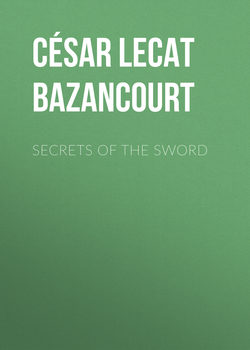Читать книгу Secrets of the Sword - César Lecat de Bazancourt - Страница 4
The First Evening
II
Оглавление“To begin then; my first object will be to make my meaning perfectly plain. The thing to do will be to take fencing in its broad outlines. It would be labour thrown away to enter the bewildering labyrinth of those interminable details, which after all are nothing more than the mathematical extension of elementary principles, which may be continued to infinity.
“Fencing in its infancy had to feel its way; its methods were yet to be found, its possibilities to be explored. Little by little, as one period succeeded another and the art became in many respects perfected, changes were introduced, and especially changes that tended to greater simplicity. Old theories became old fashioned and were thrown aside to make room for new doctrines.
“Fencing, in fact, was developed like most other things. But we must not lose sight of the fact that the early methods of the old masters, both in Italy and France, date from the sixteenth or seventeenth century, and that the weapons employed in those days differed materially from ours in shape, weight, and function. The change of weapon has naturally led to a change of method.
“It would doubtless be interesting to the antiquary to trace the successive changes that have taken place in sword-play, and to compare it as it exists to-day with what it was in 1536, when Marozzo wrote his treatise on the sword. (Pray excuse my erudition.) The sword of that period was a wide straight blade with two cutting edges. I need not say that Marozzo was Italian. The first French work on the subject was, I believe, a treatise by Henri de Saint-Didier, which was published in 1573, and dedicated to Charles IX. At that time France was a long way behind Italy, where for twenty years already the edge had been abandoned for the point.
“It is not my intention to retrace the abstruse history of the development of swordsmanship; such an inquiry would, however, prove that in all ages the new truths were invariably denied before they established themselves as accomplished facts. There is no need then, as you will doubtless be relieved to hear, to discuss the systems of antiquity; we will pass over the intervening periods without further preface, and come down at once to modern times.
